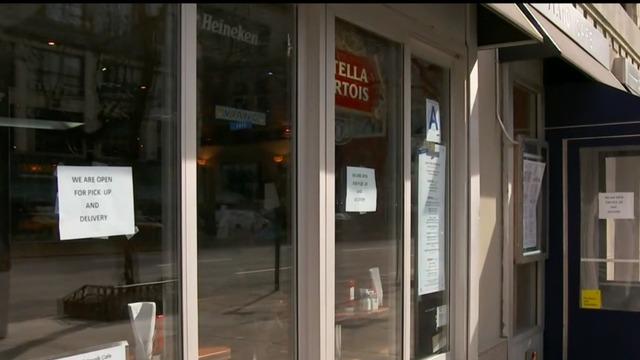Stocks edge higher as Wall Street weighs fiscal stimulus, jobless claims
Stocks rose modestly on Thursday as Wall Street eyes a potential $1 trillion federal stimulus package to help Americans whose jobs or income have been affected by the coronavirus. The Dow ended above 20,000 points after yesterday's plunge, which saw the index close below that threshold for the first time since 2017.
The Dow climbed 188 points, or about 1%, to 20,087. The gains come after the index slumped in early trading following the release of data that showed a spike in Americans applying for unemployment benefits. The S&P 500 and Nasdaq also edged up, rising 0.5% and 2.3%, respectively. Investors remain on edge after Wednesday's plunge, which wiped out nearly all of the market's gains under President Donald Trump.
The latest jobless claims data likely underestimates the true number of newly unemployed workers. Many states reported a surge in layoffs in just the last few days, as restaurants, hotels, gyms and malls closed en masse to slow the spread of the novel coronavirus. Many economists say the U.S. is entering a recession, forecasting millions of lost jobs by summer.
"We expect a total of approximately 3.5 million jobs will be lost with the biggest hit in [the second quarter] of 1 million per month," Bank of America analysts wrote on Thursday. "This will send the unemployment rate higher, nearly doubling to 6.3%."
They added that the second quarter "will be brutal."
In the week ending March 14, workers filed 281,000 jobless claims, a jump of 70,000 from the previous week. This is the highest level for initial claims since September 2, 2017, when applications for aid reached 299,000.
The report is likely "only the tip of the iceberg: These numbers do not account for the surge of new claims from overwhelmed [unemployment] websites from coast to coast," said Andrew Stettner, senior fellow at the Century Foundation and an expert in unemployment.
Through Wednesday, the Dow had lost 33% of its value since its most recent high on February 12. The decline is noteworthy for its speed, with the losses mounting over the course of four weeks. A bear market describes a decline of 20% or more from the stock market's most recent high — a painful slide that typically happens over many months not just a few weeks.
Wednesday's slump wipes out roughly three years of stock market gains, with the Dow closing below 20,000 for the first time since 2017. On January 20, 2017, the day of President Donald Trump's inauguration, the index closed at 19,827.
Investors are looking to Washington, D.C., for help, with lawmakers and the White House moving quickly to craft the parameters of a massive stimulus bill to prop up the economy in response to the coronavirus crisis.
"Jobs will be lost, wealth will be destroyed and confidence depressed," Bank of American wrote. "The salvation will come if there is a targeted and aggressive policy response to offset the loss of economic activity and ensure a sound financial system."




